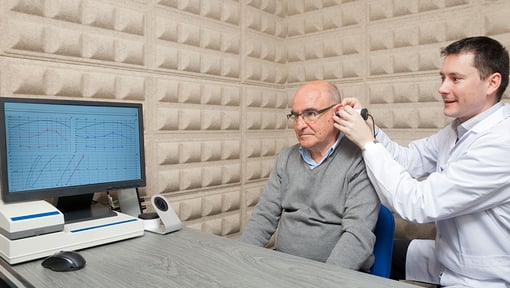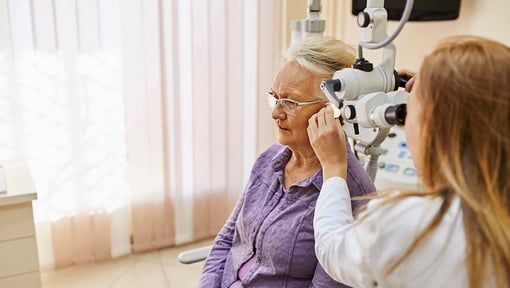You can now buy hearing aids over the counter—without a prescription. Despite the benefits, working with a hearing expert is still likely a smart move.
Hearing loss affects nearly half of all adults 75 and older in the United States. There are different types, but the most common is known as sensorineural hearing loss. Factors like age, noise, certain medicines, and some health conditions can damage the delicate structures of your inner ear, which leads to this type of hearing loss. In many cases, this hearing loss is irreversible.
Losing your hearing can affect not just your quality of life but also your health. You may find it harder to engage with others if you’re having trouble hearing. That may cause you to withdraw and become more isolated. And isolation can lead to depression.
Hearing loss can also contribute to issues with balance, raising your risk of falls. If your hearing loss is due to damage to your inner ear, that damage may lead to vertigo, a problem more common in people over age 65. Plus, experts have found links between hearing loss and cognitive decline.
Learn more about the hidden health risks posed by hearing loss.
Fortunately, hearing aids work well when it comes to sensorineural hearing loss. But due to a number of factors, there are many Americans with hearing loss who don’t use hearing aids, even though they could really benefit from them.
However, a recent rule change by the Federal Drug Administration (FDA) may change that. Hearing aids are now available over the counter (OTC)—directly from retailers. No need to see a doctor. No need to take a hearing test. No need to have a prescription.
Dr. Julie Golding is an audiologist at the St. Cloud VA Health Care System in Minnesota. She’s been in practice since 2016. She acknowledged that, for many people, there are some real benefits to hearing aids being available over the counter. But in her opinion, it’s still important for others to work closely with an audiologist.
“I think the FDA ruling allowing hearing aids to be sold over the counter will be a good thing for some individuals, in that it can remove some of the financial and logistical barriers that may have prevented them from seeking treatment for their hearing loss in the past,” said Dr. Golding.
“But I also think it may have a detrimental effect on other individuals whose hearing difficulties do need medical attention, or individuals who need more personalized attention and support with the use of the devices.”
Let’s take a comparative look at some of the pros and cons of both OTC and prescription hearing aids.

The benefits of over-the-counter hearing aids
Experts believe that making hearing aids available without a prescription will help:
- Lower costs. Prescription hearing aids can cost a lot. One source estimated that the average cost of prescription hearing aids was around $5,000. And insurance often doesn’t cover the cost. Experts estimate that new OTC hearing aids could be about $3,000 cheaper. Some experts have found that OTC models average around $1,600.
That’s still pricey, of course. But it is a little more reasonable. And with increased competition in the market that OTC hearing aids will likely spur, that cost may continue to come down. Plus, there are OTC models available for much less than $1,600. You’ll just want to make sure to research their quality before you buy.
OTC hearing aids may help you save money in other ways, too. To get prescription hearing aids, you need to get a hearing exam and have fittings with an audiologist. If you don’t have insurance coverage, you have to pay out of pocket for those. Even if you do have insurance, those costs may not be fully covered.
Medicare, for instance, may cover the cost of exams to diagnose a hearing problem, but it does not cover the costs for hearing aids themselves or for the cost of fittings. But with OTC hearing aids, you won’t need to pay for a doctor’s visit first or for a hearing exam or fitting.
However, if the price of OTC hearing aids is still out of reach for you, work with your insurance carrier to understand what they do or don’t cover. And check with various retailers to see which types of OTC hearing aids they carry and what discounts they offer. Some retailers may also take special health-based credit cards with 0% finance charges for 12 to 18 months. This may allow you to pay for your OTC hearing aids a little at a time.
- Improve access. If you have mild to moderate hearing loss, you may be able to skip the extra effort it takes to access prescription hearing aids. That means less time and effort spent on a trip to your doctor, a referral to an audiologist, or a hearing exam. And you won’t need an appointment to get fitted for your hearing aids or follow-up appointments either.
Certain barriers might make it hard for you to jump through all those hoops. You may not live near an audiologist. You may not even have a doctor close by. You may not have the time because of work or other responsibilities. Or you may not have reliable transportation.
Over-the-counter hearing aids will be easier to access. All it takes is one stop to your local pharmacy or retail store. You can even order them online if you prefer. That’s a game changer. However, if you have more than a moderate amount of hearing loss, it is still best to go through your doctor and/or an audiologist for advice on your best options.
- Spur innovation. Because they’ll cost less and be easier to access, more people might be inclined to buy OTC hearing aids. As consumer demand goes up, that might inspire some friendly competition among manufacturers. And experts predict that could spur innovation, leading to advances in technology and new features.
- Reduce stigma. You might feel that your hearing isn’t as sharp as it once was. But perhaps you don’t want to admit it because you feel a sense of shame or embarrassment.
Dr. Golding points out that some people “…may not want to admit they need help with their hearing because they do not want to seem old or do not want to seem handicapped in that way.”
But manufacturers may try to market OTC hearing aids “in a more fashionable, desirable manner” and to a much wider audience. Dr. Golding thinks this might make hearing aids seem more appealing and reduce the stigma.
 The benefits of prescription hearing aids
The benefits of prescription hearing aids
Going the route of prescription hearing aids (versus OTC aids) has some perks, too. It means getting to work closely with an audiologist. This has a number of important benefits. An audiologist can provide:
- Medical care: Dr. Golding explains how hearing trouble may be due to “…wax in the ear canals, fluid build-up behind the ear drums that may or may not be due to infection, or other disorders of the ear.” These are not issues that hearing aids can treat. These issues require medical care. An audiologist can help determine this.
- Expert guidance: There are many different types of hearing aids: in the ear, behind the ear, and open fit, to name a few. They have different features, too, like rechargeable batteries, wireless connectivity, and remote controls. An audiologist can help you choose the best hearing aid to meet your needs, as well as your personal preferences.
According to Dr. Golding, audiologists “…will take into account the severity and configuration of the hearing loss, as well as other factors…to inform their discussion of what hearing aid styles and features may be most appropriate for that specific patient.”
Lifestyle factors, such as how active you are, the type of work you do, even your hobbies, can play a role in the type of hearing aids your audiologist recommends. So can certain medical conditions, such as vision problems or hand arthritis. - Personalized fitting: To get a prescription hearing aid, you take a hearing test to measure which pitches and tones—low, medium, or high—you have the most trouble hearing. Your audiologist can then adjust your hearing aid to target those tones.
In other words, prescription hearing aids are tailored during your personalized fitting to meet your exact hearing needs.

- Care and use instructions: An audiologist can go over the basics of how to care for your hearing aids. You’ll learn how to insert and remove them, how to clean them, and how to charge them or replace the batteries.
Your audiologist will also show you how to troubleshoot common problems and control optional features. According to Dr. Golding, this includes things like “…volume control, mute, tinnitus masking sounds, and any different sound programs the aids may have.”
Plus, if you have wireless hearing aids, an audiologist can help you get them connected. Dr. Golding notes: “With the explosion in popularity of Bluetooth-enabled hearing aids in recent years, the orientation often will also include how to pair the aids to the patient’s cell phone for features like phone calls or audio streaming, and the use of proprietary apps to adjust the aids through the cell phone.” - Realistic expectations: Hearing aids can be a big adjustment. They can take time to get used to. You might experience a squeaking or buzzing feedback at times.
Background noise might be more noticeable. Your audiologist can give you a realistic sense of what to expect, so you aren’t taken by surprise. Some of those issues will resolve in time, as you get used to wearing your hearing aids. But if certain issues persist, you may need to make additional adjustments. - Follow-up care: If you need any fine-tuning, you can go back to your audiologist for adjustments. The same is true if you ever run into trouble or need maintenance. The costs of follow-up care may be included in the initial costs—or you might have to pay separately.
 How to determine whether OTC or prescription hearing aids are right for you
How to determine whether OTC or prescription hearing aids are right for youIf you think you might need hearing aids, here are a few things to consider:
- Level of hearing loss: Prescription hearing aids are good for any level of hearing loss, from mild to severe. But OTC hearing aids are only intended to treat mild to moderate hearing loss.
- Insurance coverage: Check to see which hearing services your insurance covers (exams, tests, fittings, and/or the prescription hearing aids themselves). That will affect your out-of-pocket cost.
- Availability of audiological services: Are there audiologists near you? Or do you live in a more rural area where access is limited? Can you find an audiologist in your network outside your area who does telehealth appointments?
- Your personality: Are you comfortable with technology? If so, you might enjoy setting up your own hearing aids. If you feel like you need more guidance and support, working with an audiologist might be a better choice for you.
 A note of caution
A note of caution
You may want to get a hearing test even if you plan to purchase over-the-counter hearing aids. It’s not required, of course. But it might be worth it, even if you have to pay out of pocket. It would help rule out any medical issues. And it could confirm your level of hearing loss, as well as which tones you have the most trouble hearing.
A hearing test can also help you program your OTC hearing aids to suit your specific hearing needs.
Some audiologists may even help you program OTC hearing aids. But you would want to check on that first. If you do wind up adjusting your hearing aids on your own, be careful. Dr. Golding notes that there’s a risk that you could wind up over-amplifying certain sounds. And this could actually harm your hearing more.
There are a lot of things to consider when it comes to hearing aids. More so now than ever before. But given the impact that hearing can have on your health and well-being, it is well worth it to explore your options if you are experiencing hearing loss.
Not a Silver&Fit® member? Learn more about everything the program has to offer, including more helpful healthy living tips like this, here on our website.
This information is not intended to take the place of regular medical care or advice. Please check with your doctor before using this information or beginning any self-care program. Images used for this article do not depict any members of the Silver&Fit Program.
References
American Academy of Audiology. (n.d.). Consumers and OTC hearing aids: FAQs consumers need to know. https://www.audiology.org/consumers-and-patients/managing-hearing-loss/consumers-and-otc-hearing-aids/
American Council on Aging. (2025, December 22). The 6 best over‑the‑counter (OTC) hearing aids in 2026. https://www.ncoa.org/product-resources/hearing-aids/best-over-the-counter-hearing-aids/
Crouch, M. (2022, October 17). 5 ways over-the-counter hearing aids are different from prescription ones. AARP.com. https://www.aarp.org/health/conditions-treatments/info-2022/over-the-counter-hearing-aid-facts.html
Johns Hopkins Medicine. (n.d.). How do hearing aids work. https://www.hopkinsmedicine.org/health/conditions-and-diseases/hearing-loss/how-do-hearing-aids-work
Johns Hopkins Medicine. (n.d.). The hidden risks of hearing loss. https://www.hopkinsmedicine.org/health/wellness-and-prevention/the-hidden-risks-of-hearing-loss
Johns Hopkins Medicine. (n.d.). Types of hearing loss. https://www.hopkinsmedicine.org/health/conditions-and-diseases/hearing-loss/types-of-hearing-loss#:~:text=Sensorineural%20loss%20is%20the%20most,drugs%20or%20an%20inherited%20condition
Johns Hopkins Medicine. (n.d.). What is an audiologist. https://www.hopkinsmedicine.org/health/conditions-and-diseases/hearing-loss/what-is-an-audiologist#:~:text=Audiologists%20are%20health%20care%20professionals,balance%20and%20other%20neural%20systems.
Mayo Clinic. (2025, April 24). Hearing aids: How to choose the right one. https://www.mayoclinic.org/diseases-conditions/hearing-loss/in-depth/hearing-aids/art-20044116
Mayo Clinic. (2023, March 30). Hearing loss. https://www.mayoclinic.org/diseases-conditions/hearing-loss/symptoms-causes/syc-20373072
Medicare.gov. (n.d.). Hearing aids. https://www.medicare.gov/coverage/hearing-aids
MedlinePlus. (2023, October 25). Hearing tests for adults. https://medlineplus.gov/lab-tests/hearing-tests-for-adults/#:~:text=Most%20tests%20check%20for%20your,ear%20responds%20to%20loud%20sounds
National Institute on Aging. (2023, January 19). Hearing loss: A common problem for older adults. https://www.nia.nih.gov/health/hearing-loss-common-problem-older-adults#devices
National Institute on Deafness and Other Communication Disorders. (2022, October 11). Hearing aids. https://www.nidcd.nih.gov/health/hearing-aids#:~:text=A%20hearing%20aid%20has%20three,the%20ear%20through%20a%20speaker.
National Institute on Deafness and Other Communication Disorders. (2024, June 13). Over-the-counter hearing aids. https://www.nidcd.nih.gov/health/over-counter-hearing-aids
National Institute on Deafness and Other Communication Disorders. (2024, September 20). Quick statistics about hearing. https://www.nidcd.nih.gov/health/statistics/quick-statistics-hearing
United States Food and Drug Administration. (2023, May 3). Hearing aids. https://www.fda.gov/medical-devices/consumer-products/hearing-aids
Wink, A., Reed, N. S., & Lin, F. R. (2019). Access to hearing care services among older Medicare beneficiaries using hearing aids. Health Affairs, 38(1), 124-131. https://doi.org/10.1377/hlthaff.2018.05217
This article was written by Nora Byrne, edited by Gail Olson, and clinically reviewed by Elizabeth Thompson, MPH, RDN, on July 11, 2025.





